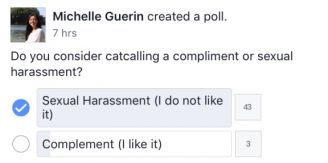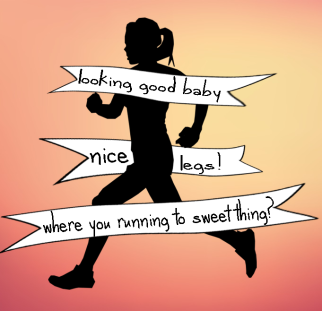Across the globe, women walk significantly fewer steps every day than men, according to a recent Stanford study. Fear of assault and harassment is attributed to this gender gap. While only about a quarter of American men do not feel safe walking alone at night, nearly half of American women do not feel safe doing so, according to Gallup. Catcalling is among the most common forms of street harassment keeping women in fear.
Catcalling, a word that means little to some but brings flashbacks to others, is when someone comments on another person’s body on the street, according to the Urban Dictionary. In certain instances, catcalling can include touching as well. Men are typically catcalling women.
Tommie Wilkins, violence against women on campus grant coordinator at Cabrini University, compared the way catcalling makes the victim feel to stalking.
“Definition wise, catcalling is not related to stalking, but it can feel that way because you are being pointed out,” Wilkins said. “Catcalling can feel like stalking [and] can be a form of stalking, especially if it is happening every day.”
Wilkins said catcalling cannot entirely be prevented, but it can be stopped by speaking out in the moment. Wilkins feels this is the best way to stop the harassment.
“Speaking up in anyway works,” Wilkins said.
Many people, women in particular, have experienced catcalling on a daily basis.
According to Runners World, 42 percent of women choose to run when it is light outside due to this issue. This survey was conducted, asking about safety and harassment concerns, and 4,670 runners responded. Men composed 2,137 of those respondents.
In addition to making the victims feel frightened, catcalling is invasive and can make the person feel degraded.

“I felt violated and scared because [the catcaller] basically kept catcalling me and telling me to come over while walking towards me when I was walking away,” Carolyn Alcantara, a sophomore studying accounting at Cabrini University, said. “I would consider catcalling sexual harassment because, in my situation, they kept calling me and harassing me to come to them when I clearly was not interested.”
A poll posted on the Cabrini University Class of 2020 and transfer page revealed, within hours, that the majority of respondents considered catcalling sexual harassment. Forty-six people responded, with 43 saying catcalling was sexual harassment.
Chelsea DiPompeo, senior studying accounting and international business at Cabrini, remembered clearly a time in Center City when she was catcalled, hearing phrases like: “Hate to see you go, but love to watch you leave.”
“There is a difference between complimenting someone and actively shouting things at them and trying to get their attention,” DiPompeo said. “I think, so often, people think this is flattering but don’t understand how terrifying it can be. I’ve had men follow me for blocks before and I refuse to wear two headphones at once if I am alone. I even make phone calls if I feel the need to have someone as back up.”
Talking on the phone is one-way women feel more secure walking alone. There are also multiple applications now that are specifically made for women that can alert nearby friends if they feel unsafe, such as bSafe, Circle of 6 and Hollaback!
“Getting catcalled makes me feel frustrated and angry,” DiPompeo said. “I’ve had a stranger come up to me and compliment me on my hair, an article of clothing or just in general, and I did not mind that at all. It is about how someone is addressing me and presenting themselves. When someone is catcalling, they are typically vulgar or shouting to get attention. I immediately get defensive and snap back.”
Noel Angelique, a sophomore at Cabrini studying biology, has experienced catcalling before.

Walking alone to a friend’s house, Angelique remembers a car with two guys following her for almost two blocks. After ignoring them was not enough, Angelique turned around to them and said, “Did it ever occur to you that I am ignoring you for a reason? I’m not interested.”
The feelings of being uncomfortable, frightened, violated, infuriated and afraid stuck with her in the situation. When the car turned the corner after she turned to avoid them, she felt threatened.
“As a whole, I do believe catcalling is a form of sexual harassment,” Angelique said. “It makes me feel as though I am being treated as an object and not as an actual human being. These issues of catcalling need to be addressed and less difficult to discuss in order for a change to occur.”
Angelique said, “Aiming for a perfect world may be impossible, but working towards a safer one is far from it.”



